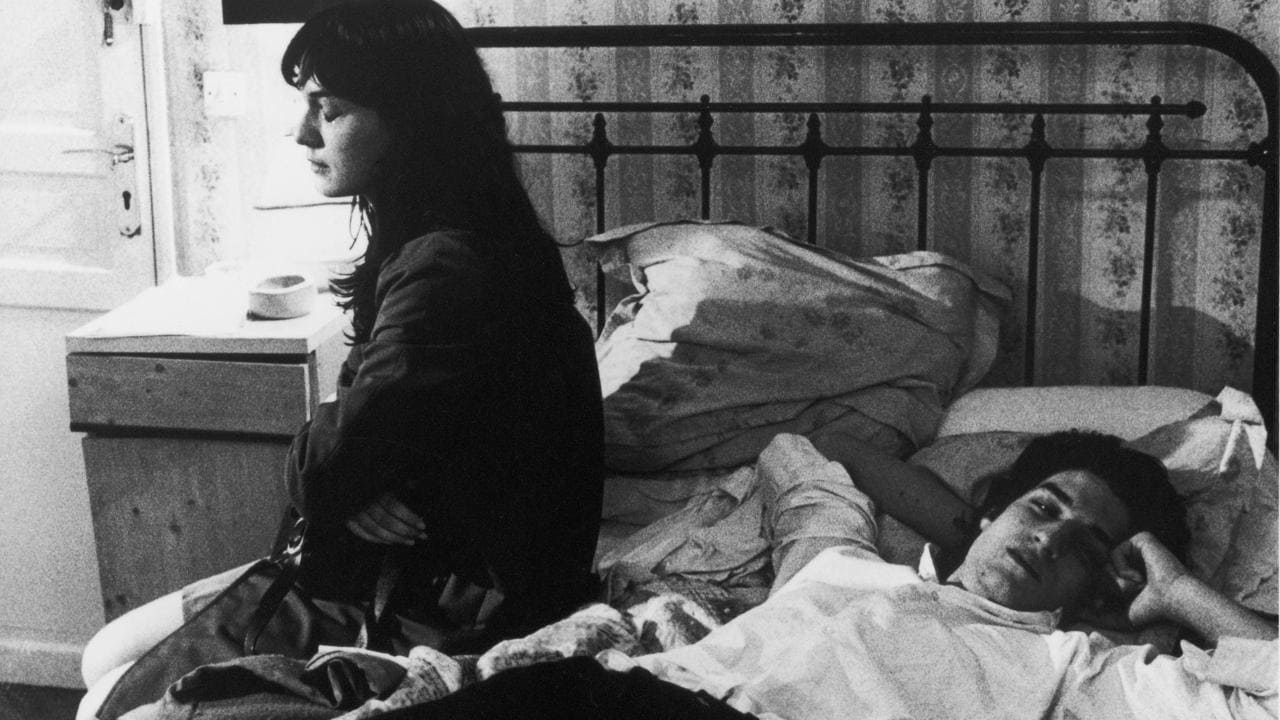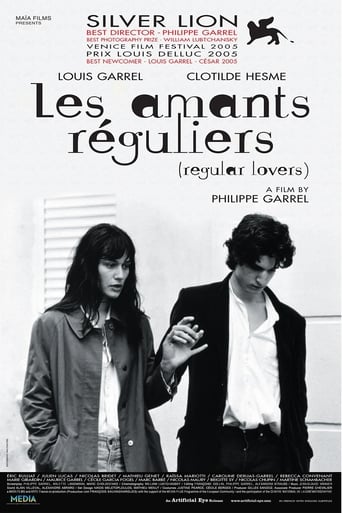Linbeymusol
Wonderful character development!
Exoticalot
People are voting emotionally.
Ogosmith
Each character in this movie — down to the smallest one — is an individual rather than a type, prone to spontaneous changes of mood and sometimes amusing outbursts of pettiness or ill humor.
Payno
I think this is a new genre that they're all sort of working their way through it and haven't got all the kinks worked out yet but it's a genre that works for me.
ironhorse_iv
This movie by Director Philippe Garrel is really hard to watch. I know this movie got a lot of praise from other critics, but in my opinion, it's not for any regular movie lovers. It's not entertaining enough to get people to watch 3 hours of it. It's so drawn out and so long to watch. It's 183 min for goodness sakes! 3 hours of a lot of boring scenes and few enjoying sequences and this isn't the Director Cut. This is the normal movie. Honestly, in my opinion, they could have cut some of the scenes down a bit. Rewrite it and have fewer scenes. The story takes forever to get started. A group of Parisian students find themselves caught up in the chaotic events of May '68 where students and workers strikes and almost gave France a civil war, or revolution. When the strikes fail, the young man François (Louie Garrel) and his clique of friends, experience the aftermath of the events and grapple with their attempts to understand what has just occurred and move on after it. By having his son play Francois, director Philippe Garrel is using him as a memento mori as a way to relive May 1968, through him. It seems to me, that Philippe wants to relive the Bohemia Nouvelle Vague hippie culture again. I hate the movie for trying to make the police look like fascists and the revolutionaries as pacifist poets. It's truly not like that. May 1968 strikes honestly hurt France economy as some of the protesters were anarchist and Stalinist. If we study Russia's history. Communist is just as bad as capitalism. After the strikes, the young adults choice to make love and art. This is where the movie get kinda boring. They talk while taking drugs. It's like watching two people mumbles and grunts follow with a few lines there and now. The action disappears and we are left with people talking a bit, stare, talking more a bit, stare, and then more talking. Once again, half of the stuff they talk about isn't need in the film. In no way, does it move the plot forward. It felt like a lot of filler scenes as if the Director took a smoke break, and left the camera running. The movie seem to suffer from a lot of audio problems. Some of the scenes where they are talking you can hear the microphone brushing upon something, deep breathing sounds or uneven audio tones. They are quiet one minute and then the other minute. Loud. The scenes are so short, it cuts like crazy. The movie has a fondness for cutting from mid-scene to mid-scene and a few primitive dream sequences notwithstanding. Francois takes part in the French revolutions of 1789 and 1848 in his dreams, but it's no way helps him step up another revolution. It's bothersome to have dream scenes and it goes nowhere. I did like William Lubtchansky's grainy, high-contrast black-and-white cinematography. The movie truly look like a student art film. The movie feels so art house film that I was afraid the movie would end up with words 'Fin'. It's like watching Bernardo Bertolucci 'Dreamers' (2003 film) without the sex and nudity. Instead of bright colors, we get none. The film's subject matter and casting mirrors that of Bertolucci, but this movie lacks any entertaining value. I did laugh at one point, one of Garrel's draft-dodging rebels tries to set fire to the French flag, and we see the whole awkward process. Other than that, I was pretty bored waiting for the film to end. The music help me stay awake. While the movie wants to be Nouvelle Vague, it's no way New Wave. They listen to singers such as Nico, even with the fact, that she didn't hit her peak until the mid 1970's and this was 1968. Most of the music choice sounds pretty classic orchestra to me as if listening to classical music. The piano plays during some of the talking scenes, so I can barely understand or hear them. It's plays throughout the scenes, and then suddenly turns off. It has no fades in or fade out. It's come out of nowhere and exits. It's a bit annoying to have random piano doodles, of the opening chords from "I Am the Walrus.". By far, the greatest part of the movie is where several of his friends are seen dancing to the song "This Time Tomorrow" by The Kinks. It's weird in a way, because the song was not released until 1970, two years after the movie takes place. I'm in love with this scene even though it breaks my heart. Francois's face at as he watches his girlfriend dance says it all. He can't enjoy himself because he knows this moment will pass, his relationship won't last forever. He knows his girlfriend can live without him, he cannot. Some of these people will break up, move away, move on, get left behind, and pass away. That's life. It will happen to everyone. The movie works with the theme of amour fou -French for mad, passionate love or obsessive love and how people deal with it. Friends fall out with each other, and he knew change was happening. Personal gradually replaces the political. Francois watches as his group metamorphoses and, as he falls in love with a young woman and starts to make new commitments, feels himself changing as well. Like I said before, it's a great theme about how life works, but it's takes a lifetime on film to get this far. It's like watching grass grow. Overall: this movie requires a commitment in time and brain power to make it worth seeing. No way is this for movie watchers. This is for people that have no life of their own, and like watching other people lives. At less they should have made a movie about somebody's life who is more adventured. That would be fun.
jasongbeale
The first 60 minutes of 'Regular Lovers' is highly recommended. The first long sequence depicts the street riots in Paris of 1968, and are extremely convincing in the combination of random images and sounds.After such a promising start, it's downhill... For another 2 hours the 'story' dwells on a tedious and passionless relationship between two young artists. Unnecessarily extended shots with no action or dialogue are little more than insipid imitations of Godard's style, without his wit or intelligence. They add nothing to this particular film I'm afraid.I love the nouvelle vague, don't get me wrong, but this film mimics 'avant-garde' techniques to end up with the equivalent of an endless Calvin Klein advertisement - bored and handsome youths lolling about, being decadent and looking so photogenic. It needs much more dynamism and emotion, either in the acting or in the editing. It might have made a tolerable 2 hour film, and perhaps more involving for this audience member.
Lasse Jensen
This film is probably the best new French film I've seen in this century so far. There have been some great ones including Noe's Irreversible, Green's Le Pont des Arts and Hadzihalilovic's Innocencebut none of them come close to Les Amants Reguliers' timeless glory.The movie is a description of the events of May 68 and what followed in the wake of it and furthermore it is and update of, and a homage to, the Nouvelle Vague-movies of those days. Concerning the depiction of the riots in Paris the movie is meticulously accurate (I'm only 19 and I wasn't there myself but you know what I mean)and the almost real-time and very long riot scenes set the stage perfectly for the aftermath of the events in the streets of Paris. The riots are not glorified or beautifully photographed like the ones in Bertolucci's The Dreamers (to which the movie is comparable in many ways) instead they are filmed in grimy black and white shots courtesy of the excellent William Lubtchansky. The love story that is the movie's main concern after the riots in 68 is filmed in stunning and far less blurred shots and manages to evoke true feelings of love and adolescent confusion in the midst of the otherwise politically concerned and seemingly cold environment.This film is a beautiful love story and it radiates through it that the director wants to depict his own experiences of those mythical late 60's which makes the film all the more compelling. But the film is also a homage to the whole Nouvelle Vague canon. Much of the dialogue evokes early Truffaut, and the length and non-action and plot less structure is reminiscent of Eustache or Rivette. There are even Godard-like verfremdung-effects with the persons looking directly into the camera and even addressing Bernardo Bertolucci directly. This film is no doubt an answer song to Bertolucci's The Dreamers and it is also a Nouvelle Vague homage but still it stands by itself as a beautiful and radiant love story.Bottom line: This movie is incredible and if you love French cinema you shouldn't sleep on it. It may be the finest french film since Eustache's La Mamain et la Putain.
mamlukman
I saw this at the Toronto Inter. Film Festival in Sept. 2005. The description seemed intriguing--how wrong I was! This could easily be the worst movie I have ever seen--in 50 years! I see the director is my age (b. 1948) and lived with Nico of the Velvet Underground, which leads us to Andy Warhol, which coincidently is the one I thought of while watching this--Warhol's 24+ hour movies of nothing much happening. This is not art, this is boredom.Specifically: black & white. OK, maybe...but what is the purpose here? Surely they had color in 1968! And there is no contrast with the present. And yes, the subtitles were in white, naturally. I don't think I missed much, but that made about 20% of them illegible.Next, it's pure chronological order, but with seemingly random events thrown in. What's the purpose of the conversation with the old man at the dinner table? It adds nothing to the movie. There were many similar scenes--almost like someone took a camcorder and filmed random people and spliced them together to make a movie.Plot? None. The "riot" consists of some figures in the distance occasionally heaving a rock off screen. Mostly it's an excruciating length of time watching people (in the distance!) stand around. The repetitive opium smoking is just as boring. When the main character got a cute girlfriend, I perked up, but no, she was boring too! This is perhaps the only French film I've seen where no one takes off their clothes. Probably they were too bored to bother.Romance? None. The girl seems totally indifferent to everything--maybe her sculpture holds some interest, but if it does, we're not shown that. We are completely indifferent to the fate of the characters because they are all unappealing. Maybe that's the point of all this?

